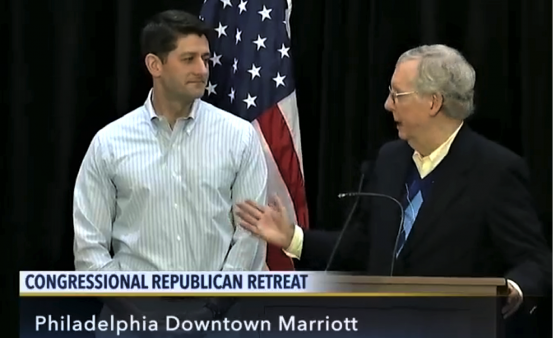In his first televised interview after being elected President of the United States, Donald Trump set a direct and unambiguous agenda for health care reform in his administration. When asked about what his repeal and replace process would look like by Leslie Stahl on 60 Minutes, Mr. Trump offered an ambitious plan for the future. At the time, Trump stated that his replacement plan would maintain coverage for people with pre-existing conditions, continue to allow children to stay on their parents’ health insurance until age 26, cost less than the Affordable Care Act, and insisted that the repeal and replacement of the ACA would happen simultaneously.
Although less blunt in their delivery, Republican leadership largely fell in line with the then President-elect, echoing his calls for maintaining certain aspects of the ACA while also pledging only to repeal President Obama’s health care law when they had a replacement plan ready to go. At a CNN Town Hall held 8 days before Trump’s inauguration, House Speaker Paul Ryan (R-WI) addressed concerns around the roll out and contents of an ACA replacement plan by affirming that the repeal and replace processes would happen simultaneously. Senate Majority Leader Mitch McConnell (R-KY) seemed to be on the same page as Speaker Ryan in early January, although he left himself a bit more wiggle room when he said on CBS’s Face The Nation that Republicans would be replacing the ACA “rapidly after repealing it.”
In the weeks since those statements were made a great deal has changed, both in terms of the projected timing of an ACA alternative and the ability of GOP leadership to corral the dissenting voices within their party and coalesce around a common plan. On January 27, the Republicans’ self-imposed reconciliation deadline came and went with no sign of any ACA repeal legislation from any of the House and Senate committees charged with creating it. In fact, the rift around how to approach replacing the ACA within the party appeared to be widening as demonstrated by remarks from the closed door Republican policy retreat going on at the same time.
On one side, senior Republicans like Senators Lamar Alexander (R-TN) and Rob Portman (R-OH) urged caution, opposing the allure of a “quick fix” to their health care conundrum and imploring their colleagues to focus on longer-term solutions that funneled the estimated savings from ACA repeal back into its replacement. In recent days, many Republicans have gone a step farther, casting aside rhetoric around repeal and replace and focusing on the notion of simply repairing or fixing the ACA. As the reality of having pledged to dismantle a law that has provided 20 million Americans with health care and has become only more popular since Trump’s inauguration with no obvious alternative waiting in the wings, many Republicans in Congress have softened their stance. Even staunch conservatives who rose to prominence through vociferous opposition to the ACA have come out in favor of this moderated language, with Senator Ron Johnson (R-WI) openly rejecting the notion of repeal and replace and talking about working with Democrats to fix the ACA.
On the other side, The Trump administration and an increasingly vocal group of conservatives like Senator Rand Paul (R-KY) and members of the Freedom Caucus have been clamoring for rapid repeal of the ACA, with House Freedom Caucus Chairman Mark Meadows (R-NC) and former Chairman Jim Jordan (R-OH) encouraging Republican leadership to use existing legislation from 2015 as a foundation for quickly putting an ACA repeal bill on Mr. Trump’s desk.
For their part, Republican leadership in Congress have remained in agreement on a vague timeline for ACA repeal, although Speaker Ryan and Majority Leader McConnell have differed on what is realistic in the coming year. At the Republican policy retreat, Speaker Ryan outlined his 200-day legislative strategy, saying that the House GOP would bring a final reconciliation package to the House floor sometime between late February and early March and that it was his aim to have health care legislation finished by the August recess. McConnell tried to tamper expectations during his remarks, taking care to emphasize the slower pace of the Senate and the fact that there were only 52 Republican Senators as reasons why the ambitious agendas of President Trump and Speaker Ryan would be harder for him to advance.
AIDS United continues to follow this issue closely and urges readers to continue calling and e-mailing their Representative and Senators to improve the ACA and to ensure that people living with or affected by HIV and all people with chronic illness have access to affordable and comprehensive health care coverage and services.








Comments
Comments